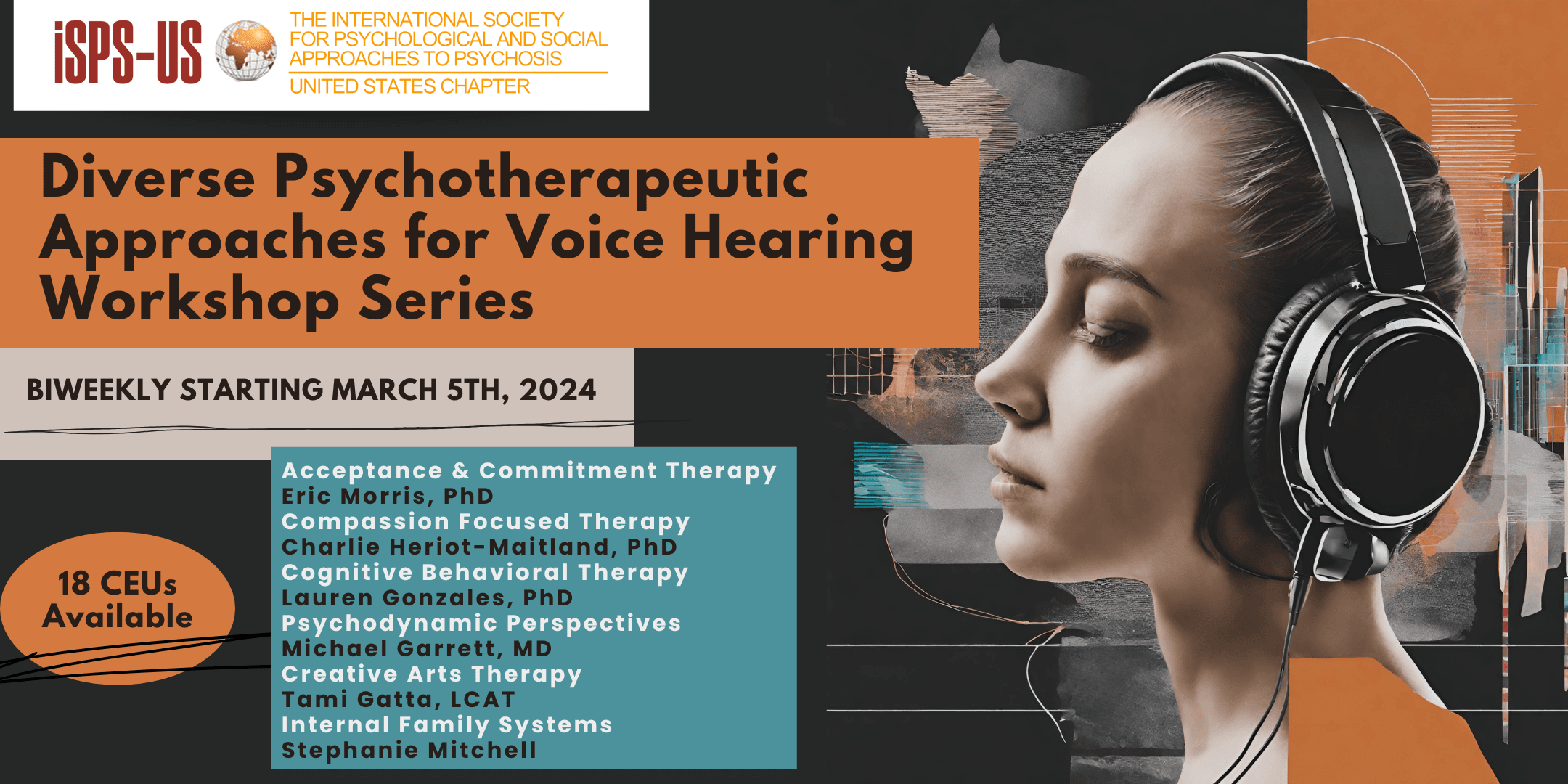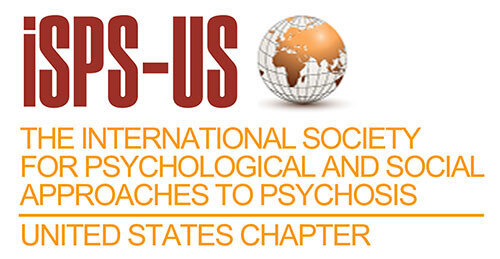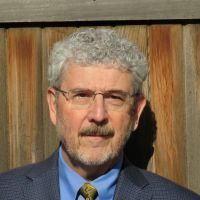Diverse Psychotherapeutic Approaches for Voice Hearing
Spring 2024 Workshop Series from ISPS-US

Join ISPS-US for our Spring workshop series, "Diverse Psychotherapeutic Approaches for Voice Hearing Series.” 18 CE hours are available for APA and ASWB boards.
This series features six biweekly, expert-led sessions, each delving into a distinct therapeutic modality, including Acceptance and Commitment Therapy (ACT), Compassion Focused Therapy (CFT), Cognitive Behavioral Therapy for psychosis (CBTp), Psychodynamic Therapy, Creative Arts Therapy, Internal Family Systems (IFS).
Through a holistic lens, participants will gain insights into the diverse perspectives and approaches, empowering them to navigate the complex landscape of voice-hearing experiences. From understanding the evolutionary roots of threat bias to engaging in compassionate self-identity development and exploring the dialogical nature of the human mind, this series provides a rich and multidimensional exploration of psychotherapeutic interventions.
Whether you're a clinician, peer professional, family member, or someone with lived experience, join us in this transformative journey towards deeper understanding, compassion, and effective support for those navigating voice-hearing experiences.
Please note that these workshops are interactive learning experiences and, therefore, should be attended live.
There are only 40 spaces available. You may elect to register for the entire six-series course or individual sessions.
Session Registration (Times Shown in Eastern.)
- Tuesday, March 5, 2024, 2pm-5pm (ET): Acceptance and Commitment Therapy (ACT) for Voice Hearing - Eric Morris, PhD
- Wednesday, March 27, 2024, 12pm-3pm (ET): Compassion Focused Therapy (CFT) for Voice Hearing - Charlie Heriot-Maitland, PhD
- Tuesday, April 9, 2024, 2pm-5pm (ET): Cognitive Behavioral Therapy (CBTp) for Voice Hearing - Lauren Gonzales, PhD
- Tuesday, April 23, 2024, 2pm-5pm (ET): Psychodynamic Perspectives on Voice Hearing - Michael Garrett, MD
- Tuesday, May 14, 2024, 11am-2pm (ET): Creative Arts Therapy for Voice Hearing - Tami Gatta, LCAT
- Tuesday, May 28, 2024, 5pm-8pm (ET): Internal Family Systems (IFS) for Voice Hearing - Stephanie Mitchell SOLD OUT
Session Details
-
Acceptance and Commitment Therapy (ACT) is a cognitive behavioural therapy that promotes open, aware and active skills to help people live meaningful lives by focusing on their personal values. ACT is a flexible model of therapy and uses evidence-based methods to help people change their behavior. For those who hear distressing voices, ACT supports them in developing a new way of dealing with these experiences. It encourages accepting emotions, connecting with personal values, and practicing mindfulness and self-compassion. The session will give an overview of how ACT helps people who hear distressing voices. It will cover how problems are understood, the use of metaphors and exercises, and how the therapeutic relationship in ACT empowers the person dealing with the voices, connecting with broader life purpose and meaning.
Speaker Bio
Dr Eric Morris is a senior lecturer and psychology academic at La Trobe University and Northern Health in Melbourne, Australia. He has over twenty-five years’ experience working as a clinical psychologist in Australia and the United Kingdom, engaging people with complex mental health problems and their families using contextual cognitive behavioural therapies. Eric has been practising Acceptance and Commitment Therapy since 2000, and training and supervising therapists in this approach since 2006. At La Trobe University ACTUALISE Lab Eric researches ACT for recovery from psychosis, insomnia, for people with autism, to support caregivers, and as a workplace wellbeing training for healthcare workers. He is a co-editor of Acceptance and Commitment Therapy and Mindfulness for Psychosis, co-author of the self-help guide, ACTivate Your Life, and co-author of the group treatment manual, ACT for Psychosis Recovery. He is a Fellow of the Association for Contextual Behavioural Science. -
This session will outline the CFT psychoeducation of how evolution has set humans up with a tricky brain that has a natural threat bias that can incline towards dissociating, problematic attention, and over-estimating threat, using ‘better safe than sorry’ algorithms. It will guide participants through the CFT formulation of voice-hearing, which focuses on their (protective) function for people, particularly in the context of interpersonal threat and trauma. Building on these de-shaming foundations in psychoeducation and formulation, participants will learn how to support people in developing a ‘compassionate self’ identity and how to switch into compassionate mind states that organize multiple physiological processes differently to that of threat states. Participants will learn techniques that support people in applying compassionate competencies to achieve therapeutic change, with illustrative examples of interventions such as parts work, voice-dialoguing, imagery, letter-writing, and interventions that use role play, chair work embodiment and acting techniques.
Speaker Bio
Charlie is a clinical psychologist, researcher and trainer. For the first 13 years of his career, he provided psychological therapies in the UK National Health Services (NHS) and is now Director of an organization called Balanced Minds (balancedminds.com), which specializes in providing therapy and training in Compassion Focused Therapy (CFT). Charlie continues to provide supervision, training, and consultancy in the NHS, as well as other organizations across multiple sectors, including healthcare, social care, education, and charities.As a researcher, Charlie has spent several years investigating CFT and the application of CFT for people who are experiencing distress in relation to psychosis. He has authored a number of academic papers and book chapters on this subject, as well as a self-help book for voice-hearers (relatingtovoices.com). He regularly runs compassion training workshops for professionals and for the general public, both nationally and internationally.
-
This workshop will provide an introductory overview of the Cognitive Behavioral Therapy for psychosis (CBTp) approach to working with voice hearing experiences. Emphasis will be placed upon conceptualizing voice hearing from the CBTp perspective, followed by an introductory discussion of assessment and intervention strategies for distressing voices. Empirical findings and clinical considerations for when to use CBTp will also be discussed. This virtual workshop will emphasize active and dynamic participation using a combination of lecture, discussion, and role-play didactic strategies.
Speaker Bio
Lauren Gonzales is a licensed clinical psychologist and Assistant Professor at Columbia University Irving Medical Center. She earned her Ph.D. in Clinical Psychology from John Jay College and the Graduate Center, CUNY where she specialized in recovery-oriented mental health services for individuals experiencing psychosis. She completed a predoctoral internship and postdoctoral clinical psychology fellowship at the University of California, San Francisco Medical Center. Dr. Gonzales has specialized training in Cognitive Behavioral Therapy for Psychosis (CBTp) and extensive experience training mental health providers in CBTp and evidence-based clinical approaches to working with psychosis and related experiences. -
The human mind is dialogical in its essential nature. As was said by Plato, thinking involves a conversation with one's self. The speaker will describe how the voice hearing experience can be viewed as a particular variant of a universal capacity to engage in an internal dialogue that is resident in all human beings. In everyday life, people may engage in self-talk, as when a person gives themself a directive, as in "You should finish your workout before doing anything else," or issue an evaluative, "You idiot! See what happens when you try to take shortcuts!" Voices sometimes give directives and issue evaluations. The seminar will explore the relationship of voice-hearing to ordinary mental life, seen through the lens of psychoanalytic object-relations theory.
Speaker Bio
Dr. Garrett presently lives and works in the small town of Lambertville, NJ within view of the Delaware River Canal. He was formerly the Vice Chairman of Psychiatry at SUNY Downstate Medical Center, where he is currently Professor Emeritus of Clinical Psychiatry. He is also on the faculty of the Institute for Psychoanalytic Education (IPE) affiliated with NYU Medical Center in New York City. He received his medical degree from the Albert Einstein College of Medicine and completed his residency training in Psychiatry at Bronx Municipal Hospital Center. Most of Dr. Garrett’s professional career has been spent in the public psychiatry sector, first at North Central Bronx Hospital, where he became Associate Director of Psychiatry, and then Medical Director in 1995. In 1997 he became Deputy Director of Psychiatry at Bellevue Hospital, where he was responsible for clinical services. In 2003 he moved to SUNY Downstate as Vice Chairman for Clinical Services. At present his time is evenly divided between patient care, supervision of psychotherapy for psychosis, including consultation with several first-episode of psychosis teams in the United States, teaching, and clinical writing. He has for many years had an interest in the difficulties clinicians encounter when trying to develop a relationship with psychotic individuals who have a fundamentally different view of reality than the clinician. He has a particular interest in the relationship between psychosis and ordinary mental processes and combined psychodynamic and cognitive behavioral treatments of psychosis, as detailed in his recent book: Garrett, M. (2019) Psychotherapy for Psychosis: Integrating Cognitive Behavioral and Psychodynamic Treatments. Guilford Press/New York. -
This workshop provides insights into the value of utilizing the arts when supporting individuals who hear voices, see visions, and experience other sensory phenomena. Attendees will review the basic tenets of the Hearing Voices Movement, and gain an introductory understanding of the creative arts therapies. Through theoretical presentation and experiential activities, participants will be asked to reconsider traditional approaches to mental health support, and engage in creative approaches to building self-awareness and stress reduction. No artistic experience is necessary!
Speaker Bio
Tami Michelle Gatta is a graduate of NYU’s Steinhardt School, where she earned her MA in Drama Therapy. A Licensed Creative Arts Therapist, she has chosen to further her trauma studies in both the US and abroad. In 2013, Tami became the first American to complete a 3-month externship with Ron Coleman and Karen Taylor in respite care and alternatives to hospitalization for individuals navigating voices, visions and other experiences deemed “psychosis.” In 2015, Tami began speaking more openly about her own trauma history and mental health struggles, ultimately becoming a Certified Peer Specialist. In 2016, she graduated from the Institute for Arts in Psychotherapy, where she went on to become Co-Director. In 2017, Tami was presented with the World Hearing Voices Congress Award for “Outstanding Contribution to the Growth and Development of the International Hearing Voices Movement.”Tami is the founder of Gatta Creative Arts Therapy, PLLC pending, where she provides individual psychotherapy and trauma-informed supervision to peers, students, clinicians and supervisors. She is also the co-founder of Curious Rebels, LLC, a CE granting, training and consulting firm, which offers professional support series on mental health and staff retention, the incorporation of peer specialists into the workforce, trauma-informed care, vicarious resilience, as well as a 3-year post-graduate program geared towards using improvisation and embodiment as a means of healing. Tami is a co-founder of Hearing Voices Network NYC, where she is a primary trainer in the Hearing Voices Movement. Tami is committed to ongoing personal growth, and emphasizes queer-empowering, anti-racist, fat liberation work that addresses historic and present inequities in mental health treatment.
-
In this workshop, participants will learn how to view voice hearing through an IFS lens. We will show how IFS offers a distinctive, holistic, ecological, non-pathologizing lens through which to understand and work with various voice hearing experiences. Participants will also be invited to recognize the parts of themselves that are activated by our client-teachers and learn to make use of this activation to deepen our connection to our own parts and the parts of our clients, to bring more self-energy, and co-create a rich relational healing environment.
Speaker Bio
Stephanie Mitchell is a psychotherapist, teacher, and consultant in private practice in Australia. She is also Certified by the IFS Institute as a Level 3 IFS Therapist. Stephanie specialises in working with developmental trauma and experiences which often get labelled as 'mental illness'. She is interested in how healing and change occur in the human-to-human relationship, within spaces of safety and acceptance and outside the constructs of diagnostic labels.Stephanie works from a deeply compassionate place that believes that all patterns of behaviour, thought or feeling come with important and valuable, hidden meanings, and that as the client and therapist work together to listen to the parts who hold these important and previously unknown meanings and offer them a space to be heard, witnessed, and deeply understood, that deep change and inner transformation is stirred up.
Stephanie’s initial training included 3 years of advanced studies in Transactional Analysis, and she has since trained in Family Systems Therapy, Person Centred Therapy, Yalom Group Psychotherapy, and Open Dialogue, before moving over to working exclusively with Internal Family Systems Therapy (IFS). Beyond her Level 3 training and certification in the IFS Model, Stephanie has undertaken extensive supervision, additional training, and personal work in IFS Therapy.
Believing that a therapist can only take a client as far as they themselves have travelled Stephanie has undertaken her own long journey of healing from significant childhood trauma over many years of psychotherapy and human loving. Stephanie has over 500 hours of her own personal therapy with an IFS Practitioner and is deeply acquainted with her own parts, embodying the IFS model from the inside out.
She is also a passionate advocate and activist for social and systems change towards non-pathologising and compassionate approaches to mental distress and is involved at national and international levels around mental health reform. Stephanie is excited to be collaborating with Professor Ian Whitmarsh and Professor Sharon Lawn around an international research study on 'IFS and Non-ordinary states of awareness', which often get diagnosed as 'psychosis'.






